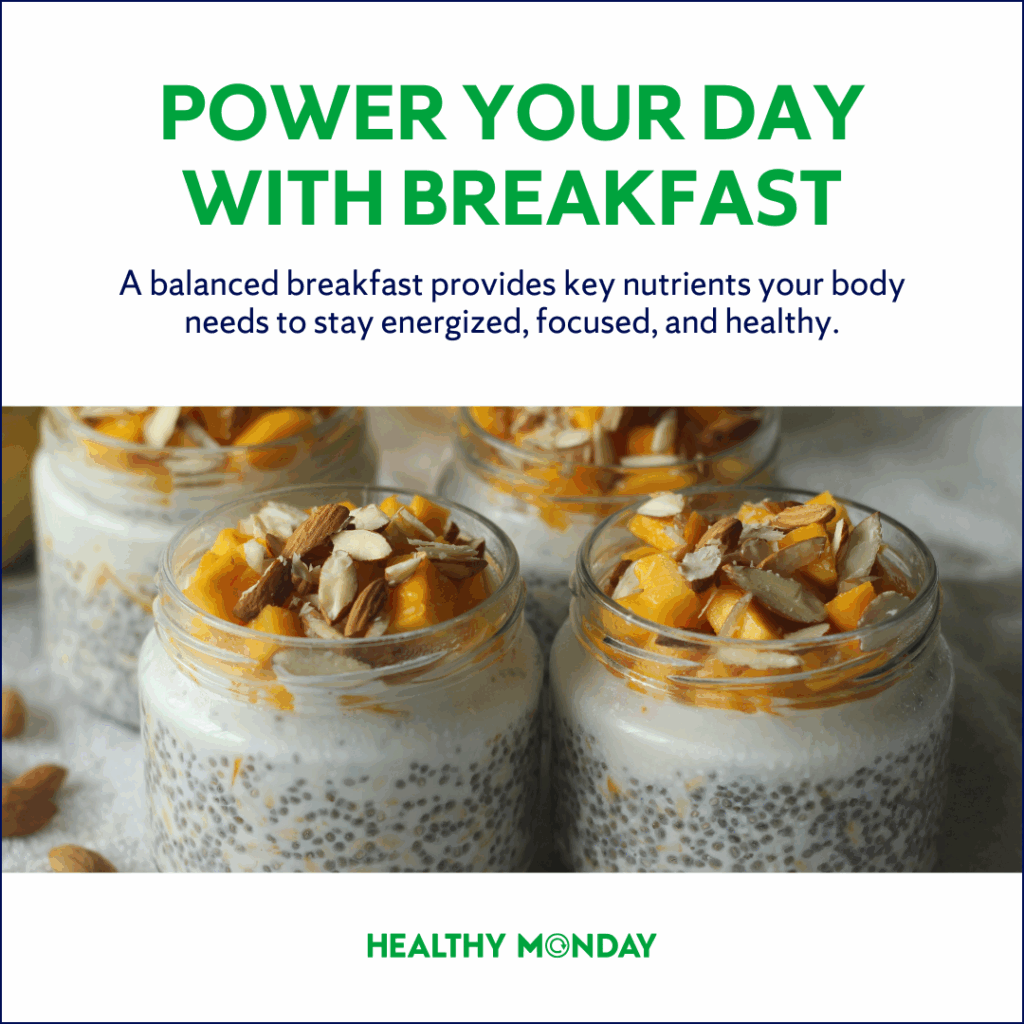Fuel Your Day: The Role of Breakfast in a Healthy Diet
Mornings can be hectic. The alarm goes off, emails are already piling up, and if you’re lucky, you manage to pour a cup of coffee before rushing out the door. In the whirlwind of getting ready, answering texts, or beating traffic, it’s easy to let breakfast slide. So easy, in fact, that research shows nearly one-quarter of U.S. adults skip breakfast entirely.
But here’s the thing: skipping that first meal may mean missing more than just food. One study found that people who skip breakfast tend to fall short on several essential nutrients—and they don’t usually make up for them later in the day.
This Monday, learn how a balanced breakfast can provide the fuel your body needs to boost energy, sharpen focus, and support your overall well-being all day long.

The Role of Breakfast in a Healthy Diet
Breakfast has been linked to a variety of short- and long-term health benefits. Eating a balanced morning meal can help improve energy levels, concentration, and mood, while also supporting better appetite control throughout the day. Compared with people who skip breakfast, those who eat it regularly tend to have a lower risk of both obesity and type 2 diabetes.
Researchers analyzed the eating habits of more than 30,000 U.S. adults and compared the diets of those who ate breakfast with those who didn’t.
Here’s what they discovered:
- Adults who skipped breakfast consumed fewer key nutrients, including fiber, calcium, iron, potassium, folate, and vitamins A, C, D, B1, B2, and B3.
- They also had poorer overall diet quality, as measured by the Healthy Eating Index.
- Even though breakfast skippers often ate more calories later in the day, they didn’t make up for the nutrients they missed in the morning.
Why These Nutrients Matter
Many of the nutrients commonly found in breakfast foods play essential roles in how we feel and function throughout the day. Calcium and vitamin D support strong bones and muscle function, while fiber aids digestion and helps you feel fuller longer. Iron and folate contribute to healthy energy levels and brain function. Vitamins C and A help keep your immune system strong, and B vitamins are key players in converting food into energy and supporting cell function.
Missing these nutrients regularly can contribute to symptoms like fatigue, weakened immunity, and even long-term health concerns.
Make Breakfast a Healthy Habit
Creating a healthy breakfast routine doesn’t have to be complicated or time-consuming. With a few simple strategies, you can make nourishing your body each morning a habit that sticks. Many experts recommend eating breakfast within an hour or two of waking up to help regulate energy levels and support your body’s natural rhythms.
If mornings are a rush, try prepping ahead on the weekend. Bake whole-grain muffins or oatmeal cups with fruit and nuts, then freeze them for a grab-and-go option during the week. Smoothies are another great make-ahead meal. Keep it chilled in a thermos for a ready-to-drink breakfast.
Here are a few quick, balanced options that provide fiber, protein, healthy fats, and vitamins to support your day ahead:
- Apple with nut butter
- Greek yogurt with berries and a sprinkle of granola
- Oatmeal with chopped nuts and dried fruit
- Smoothie with spinach, frozen fruit, and your favorite plant milk
- Whole-grain toast with an avocado and a hard-boiled egg
Rethinking the Morning Rush
When mornings get busy, skipping breakfast can feel like no big deal. But it often means missing out on important nutrients that keep us energized and focused throughout the day.
This Monday, make breakfast a part of your routine. Carve out a little space, mentally and physically, to eat something nourishing. It might be the very thing that helps you move through the day with more clarity, steadiness, and ease.
That said, breakfast isn’t one-size-fits-all. If you’re not hungry in the morning, there’s no need to force it. The most important thing is to listen to your body and aim to include a variety of nutritious foods throughout your day, whenever it works best for you.


